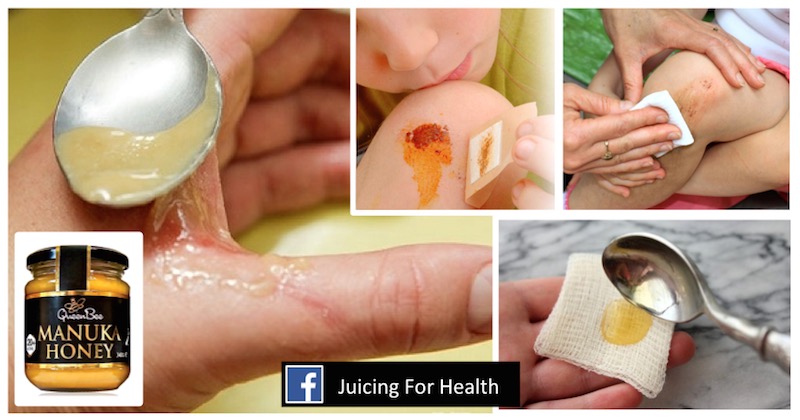Manuka Honey Can Kill Every Kind Of Bacteria You Throw At It (Even The Superbugs!)
Last updated on
Scientists have recently discovered yet another reason why we must save nature’s pollinators from extinction, specifically in this case, honeybees. In addition to the invaluable pollination services they provide, honeybees may also be a source of alternative tools to fight infections in the face of ever-increasing numbers of antibiotic-resistant pathogens.
Researchers at Lund University in Sweden have identified 13 lactic acid bacteria strains found in fresh honey that produce a multitude of active antimicrobial compounds. Their study results were published in the International Wound Journal in September 2014.1
Bacteria In Fresh Honey Heals Wound Infections
Fresh raw honey has been used throughout history to treat infections. It is found in the honey stomach of bees and is quite different from the manufactured honey sold in grocery stores. In fact, highly processed store-bought honey is akin to high fructose corn syrup, which is more likely to increase infection and should never be used to treat topical wounds.
The bee honey bacteria was tested in the laboratory on severe human wound infections such as MRSA (methicillin-resistant Staphylococcus aureus), Pseudomonas aeruginosa and vancomycin-resistant Enterococcus (VRE). When the bacteria was applied to the infectious organisms in the lab, it neutralized all of them.
The lactic acid bacteria has also been tested on horses with persistent wounds. The bacteria was blended with honey and applied to the wounds of ten horses—wounds that had not responded to any other treatment.
The result? The honey mixture healed all of the horses’ wounds.
The same formula has also previously been shown to protect against bee colony collapse.
Living Lactic Acid Bacteria Has Unique Properties
The Lund University researchers believe these promising results are due to the broad spectrum of active antimicrobial substances that are unique to the honey found in a bee’s honey stomach. According to lead study author Tobias Olofsson:
“Antibiotics are mostly one active substance, effective against only a narrow spectrum of bacteria. When used alive, these 13 lactic acid bacteria produce the right kind of antimicrobial compounds as needed, depending on the threat.
“It seems to have worked well for millions of years of protecting bees’ health and honey against other harmful microorganisms. However, since store-bought honey doesn’t contain the living lactic acid bacteria, many of its unique properties have been lost in recent times.”2
The researchers plan to conduct further studies on the use of honey to treat topical infections in humans and animals.
Manuka Honey
Manuka honey is produced by bees that pollinate the manuka shrub (Leptospermum scoparium), which is a medicinal plant native to New Zealand. Its active ingredient, methylglyoxal (MG), is a compound found in small amounts, in most types of honey. In manuka honey, MG comes from the conversion of dihydroxyacetone— a substance that is highly concentrated in the nectar of manuka flowers.3

Clinical trials have found that manuka honey can effectively eradicate more than 250 clinical strains of bacteria, including certain antibiotic-resistant varieties.4
Manuka has an exclusive ingredient with antimicrobial qualities called the Unique Manuka Factor (UMF) that give it extraordinary antibacterial activity. Honey releases hydrogen peroxide through an enzymatic process that gives it its antiseptic qualities, but active manuka honey contains a “special something” that makes it far superior to other types of honey when it comes to killing off bacteria.
The level of UMF varies, which is why each batch of manuka is ranked and priced according to the quantity of UMF it contains. The higher the concentration of UMF, the darker, thicker, and more expensive the honey. A rating of UMF 10 or higher is recommended for medicinal use.
The honey used to treat wounds is a medical-grade honey, not just a jar from a shelf in a kitchen. Medical-grade honey is cultured to insure it doesn’t contain bacterial contaminants.
The Uniqueness Of Manuka Honey
What makes Manuka honey different is its amazing nutritional profile. Regular raw honey is already known for its tremendous nutritional and immune boosting abilities. Generally speaking, the typical raw unfiltered honey is a rich source of:
- Amino acids
- B vitamins (B6, thiamin, niacin, riboflavin, pantothenic acid)
- Calcium
- Copper
- Iron
- Magnesium
- Manganese
- Phosphorus
- Potassium
- Sodium
- Zinc
Yet with Manuka honey, the nutritional content is up to 4 times that of normal flower honeys. This is what is called the Unique Manuka Factor (UMF).
When looking to buy manuka honey, look out for the UMF rating that should be above UMF 10. Don’t buy anything below 10. UMF 10-15 would be sufficient for maintaining general health and vitality. For therapeutic effects of manuka honey, look for UMF 15+ or even UMF 20+. The higher the UMF, the pricier it may be, but you can be assured of its quality.
The Incredible Health Benefits Of Manuka Honey
The high nutrient and mineral content in manuka honey makes it superior as an excellent help for many health issues. It has been shown to be beneficial to be used for treating ailments of bacterial and inflammatory nature:
- Gastritis
- Acid reflux
- Colonic inflammation: Peptic ulcers, IBS, IBD
- Common cold and flu
- Cough and sore throats
- Tonsilitis
- Sinusitis
- Allergies
- Skin conditions
- Fungal infections
- Staph Infection (MRSA)
- Dandruff and scalp problems
- Cuts and burns
How To Use Manuka Honey
To experience the most benefit, you should take a dose of about 1-2 tablespoons of manuka honey a day. The easiest way is to just take it straight, but if it is a little too sweet for you, then you can add it to your favorite herbal tea, in yogurt, or on sprouted grain toast.
If you want to enhance the immune boosting effect or heal a sore throat, add 1 teaspoon cinnamon. Research shows that the antimicrobial properties of cinnamon and manuka honey are so powerful, that they can really help you recover fast!
Source: Mercola.com
Some of the links I post on this site are affiliate links. If you go through them to make a purchase, I will earn a small commission (at no additional cost to you). However, note that I’m recommending these products because of their quality and that I have good experience using them, not because of the commission to be made.
































 JOIN OVER
JOIN OVER
Comments